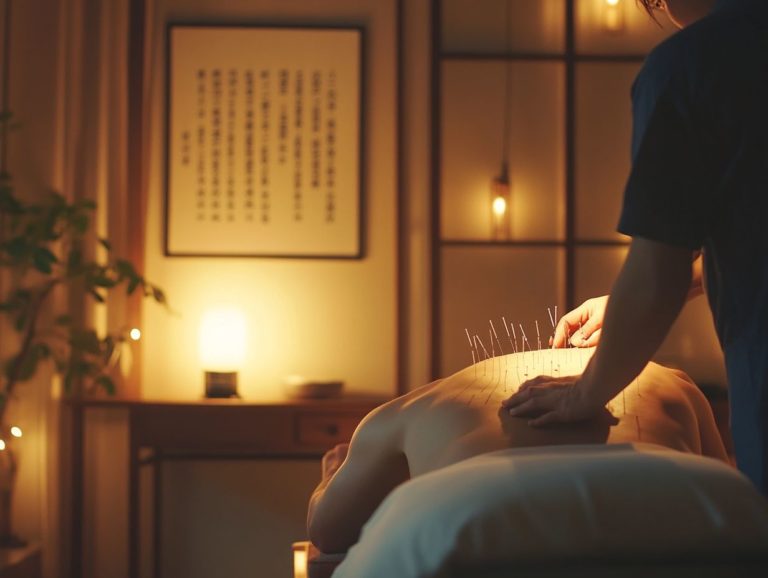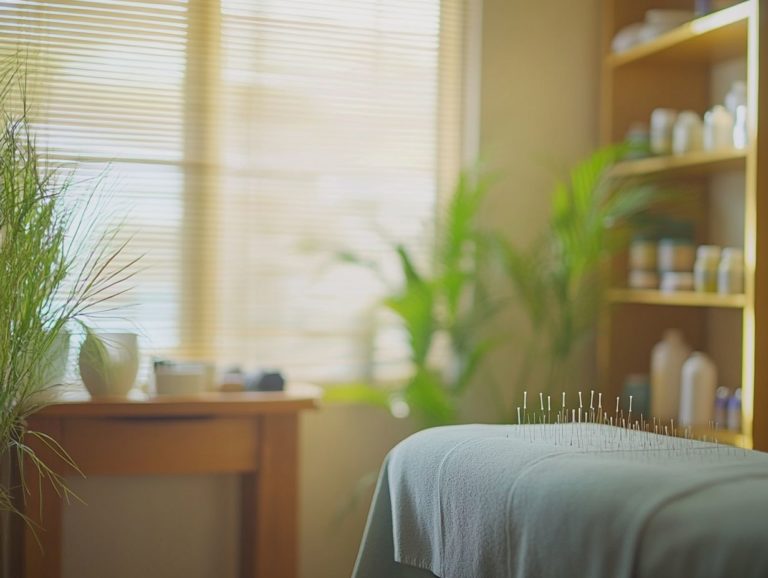Acupuncture Benefits: How It Can Improve Your Health
Acupuncture, an ancient practice steeped in Traditional Chinese Medicine, is known worldwide for its remarkable ability to enhance both physical and mental well-being.
This article delves into the essentials of acupuncture tracing its rich history, explaining the principles that support its techniques, and highlighting the numerous benefits it can provide.
You ll uncover common ailments that acupuncture effectively treats, learn what to expect during a session, and discover how to locate a qualified practitioner.
Explore how incorporating acupuncture into your health regimen could transform your approach to wellness!
Contents
Key Takeaways:

Experience the ancient benefits of acupuncture that have been used for centuries to improve physical and mental health.
Learn how acupuncture supports your body s natural energy to heal.
Find a qualified acupuncturist and prepare for your session to maximize the benefits and achieve overall well-being.
What is Acupuncture?
Acupuncture stands as a cornerstone of Traditional Chinese Medicine (TCM), where sterile needles are skillfully inserted into specific acupuncture points along the body’s energy pathways. This process is designed to promote the smooth flow of vital energy, known as chi (vital energy).
Rooted in a rich history that spans thousands of years, acupuncture seeks to restore balance and elevate overall health. By facilitating the body s innate healing processes, it effectively addresses a range of health conditions, including pain management, emotional well-being, and chronic ailments.
Overview and History
Acupuncture boasts a rich history spanning over 2,500 years, grounded in the belief that your health hinges on the balance of chi, the vital energy coursing through your body.
Its origins can be traced back to ancient China, where early practitioners utilized sharpened stones and bones to stimulate specific points on the body. This set the stage for what would evolve into an intricate and sophisticated treatment modality.
Throughout the centuries, acupuncture underwent remarkable transformations, including the standardization of techniques and the introduction of fine metal needles during the Han dynasty.
This ancient practice has stood the test of time and seamlessly integrated into modern healthcare, earning recognition as an effective means of managing pain and enhancing overall well-being.
Many healthcare professionals now see the value of acupuncture, harmonizing ancient wisdom with contemporary medical practices to address a wide array of health concerns.
How Acupuncture Works
Acupuncture is grounded in the principle that by stimulating specific points along the energy pathways, you can restore the equilibrium of chi.
This delicate balance enhances therapeutic benefits like pain relief, stress reduction, and improved emotional well-being.
Principles and Techniques
The principles of acupuncture revolve around the belief in energy flow throughout your body, utilizing techniques like needle insertion, a method where mugwort is burned near acupuncture points, and cupping to restore harmony and promote healing.
Each of these methods serves a distinct purpose in activating your body s self-healing capabilities. For instance, needle insertion targets specific acupuncture points to enhance the flow of chi an essential energy that plays a pivotal role in your health.
The method where mugwort is burned near these points warms and invigorates energy pathways, making it particularly beneficial for conditions like arthritis and digestive issues.
Cupping, on the other hand, creates suction on your skin, improving circulation and alleviating muscle tension. By addressing stagnation and enhancing therapeutic outcomes, these techniques work together to support balance and well-being, positioning themselves as invaluable tools in holistic health practices.
Benefits of Acupuncture

Acupuncture presents an array of wellness benefits that can significantly enhance your quality of life. For example, how acupuncture can benefit your overall health includes effective pain management, fostering improved emotional well-being, and facilitating stress reduction.
As a result, it has become a sought-after option for individuals pursuing holistic health solutions.
Experience the life-changing effects of acupuncture today!
Physical and Mental Health Benefits
Acupuncture offers significant physical and mental health benefits. Studies show it effectively relieves pain, reduces anxiety and depression, treats insomnia, and boosts the immune system, including improvements in skin health.
Numerous clinical trials and compelling anecdotal evidence showcase the diverse applications of this ancient practice. Many individuals grappling with chronic pain experience significant relief after consistent treatment.
Research from esteemed institutions, such as the National Institutes of Health, underscores acupuncture’s value as a complementary therapy for mental health conditions. It proves especially beneficial for those dealing with stress-related challenges. Patients often report feeling more relaxed and mentally clear after sessions, effectively mitigating anxiety symptoms and enhancing their overall emotional well-being.
These findings highlight acupuncture s role in fostering not just physical health, but also a balanced state of mind. This makes it a highly appealing option for holistic wellness.
Conditions Treated by Acupuncture
Acupuncture is esteemed for its remarkable capacity to address a wide array of health conditions, from chronic pain and digestive troubles to respiratory issues and hormonal imbalances, and it plays a role in supporting overall wellbeing.
Common Ailments and Health Issues
Some of the most prevalent conditions treated with acupuncture include fibromyalgia, osteoarthritis, asthma, and various stress-related issues. This presents you with a holistic approach to enhancing both emotional health and physical well-being.
This ancient practice revolves around balancing your body’s energy, called Qi (pronounced ‘chee’), through the careful insertion of thin needles at strategically chosen points. This supports your body’s innate healing capabilities.
If you are grappling with fibromyalgia, you might discover a notable reduction in pain and an improvement in sleep quality. Those dealing with osteoarthritis often experience relief from inflammation and stiffness, leading to enhanced mobility.
If you’re facing asthma challenges, acupuncture could help you enjoy fewer symptoms and improved lung function. This is because it promotes relaxation and mitigates stress levels, which are common triggers for asthma attacks.
For stress-related conditions, the treatment focuses on fostering emotional stability, giving you the power to cultivate greater calm and resilience in your everyday life.
What to Expect During an Acupuncture Session
During an acupuncture session, you can anticipate a serene and nurturing atmosphere. The practitioner will employ sterile needles to precisely stimulate acupuncture points, fostering relaxation and enriching your overall treatment experience.
Procedure and Experience

The process of acupuncture involves the meticulous insertion of sterile needles into specific acupuncture points. This is designed to promote relaxation and deliver therapeutic benefits.
This skilled practice is typically carried out by trained practitioners who assess your needs and conditions while discussing your health history.
Using ultra-fine, sterilized needles, these experts prioritize your comfort, ensuring minimal discomfort during insertion. You might feel a slight tingling or warmth in the targeted areas, but many individuals report experiencing deep relaxation as the treatment encourages the body s natural healing processes.
With a strong emphasis on maintaining a clean and controlled environment, acupuncture boasts an impressive safety record. This makes it a trustworthy option for those seeking non-invasive pain relief and an overall enhancement of well-being.
Finding a Qualified Acupuncturist
Finding a qualified acupuncture practitioner is crucial for ensuring your treatment is effective. It requires a careful evaluation of their certification, experience, and approach to patient care.
Take the time to assess these factors to make an informed choice that aligns with your health needs.
Tips for Choosing a Practitioner
Finding the right acupuncture practitioner is essential. Focus on their credentials, patient reviews, and experience with your specific health condition.
Start by checking their qualifications. Look for proper certifications and educational background to ensure you’re in capable hands.
Patient reviews are crucial too. They provide insights into the acupuncturist’s effectiveness and care philosophy, helping you feel comfortable before your first session.
Personal compatibility is key in the healing process. A trusting relationship with your practitioner can enhance your overall experience.
Invest time in researching these qualities. Doing so can lead to a successful and fulfilling acupuncture journey.
Frequently Asked Questions
What is acupuncture and how can it improve my health?
Acupuncture is a traditional Chinese medicine technique. It involves inserting thin needles into specific points on the body to promote healing, reduce pain, and balance energy flow.
What conditions can acupuncture help with?

Acupuncture can address many conditions, including chronic pain, headaches, digestive issues, anxiety, and infertility. Additionally, it highlights the benefits of regular acupuncture treatments as a preventive measure for maintaining overall health.
How does acupuncture improve health?
Acupuncture stimulates specific body points, known as acupoints. This promotes energy flow and releases natural pain-relieving chemicals, restoring balance and enhancing health.
Is acupuncture safe?
Acupuncture is generally safe when performed by a trained and licensed professional. The needles are sterile and disposable, and the procedure is non-invasive. Always disclose any medical conditions and medications to your acupuncturist before treatment.
How many acupuncture sessions are needed to see results?
The number of sessions varies by individual and health concerns. Some may find immediate relief, while others might need multiple sessions. Your acupuncturist will create a personalized treatment plan.
Are there any side effects of acupuncture?
Common side effects include minor bruising, soreness, or mild bleeding at the needle sites. These effects are usually minimal and temporary. Seeking treatment from a qualified acupuncturist can reduce the risk of adverse effects.






